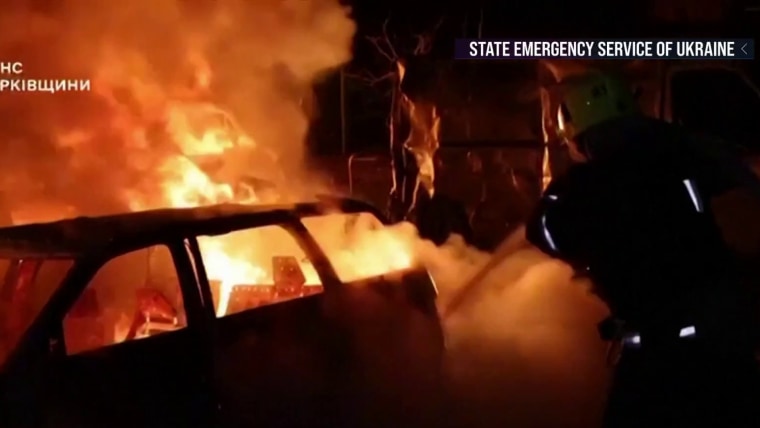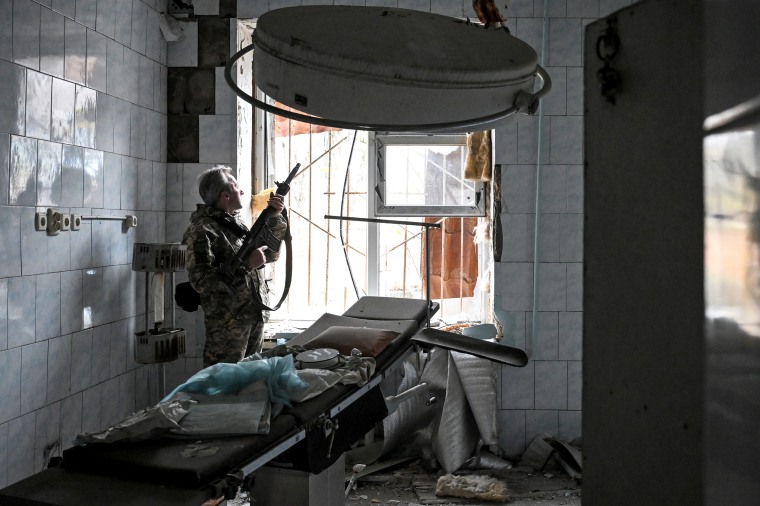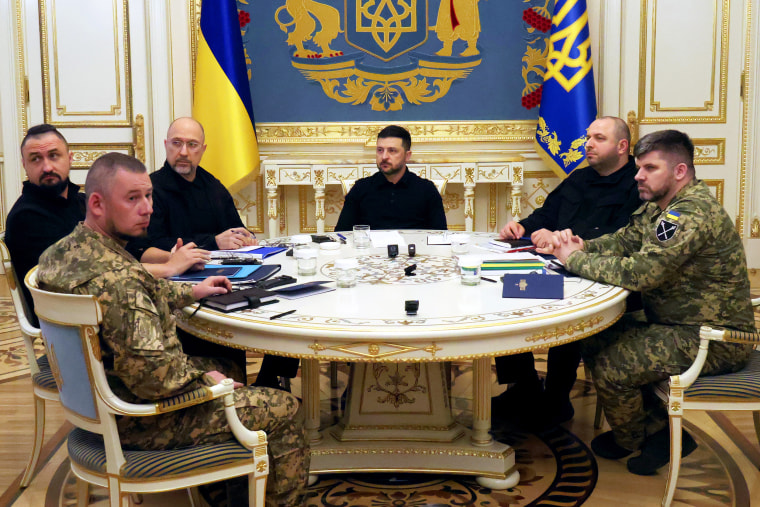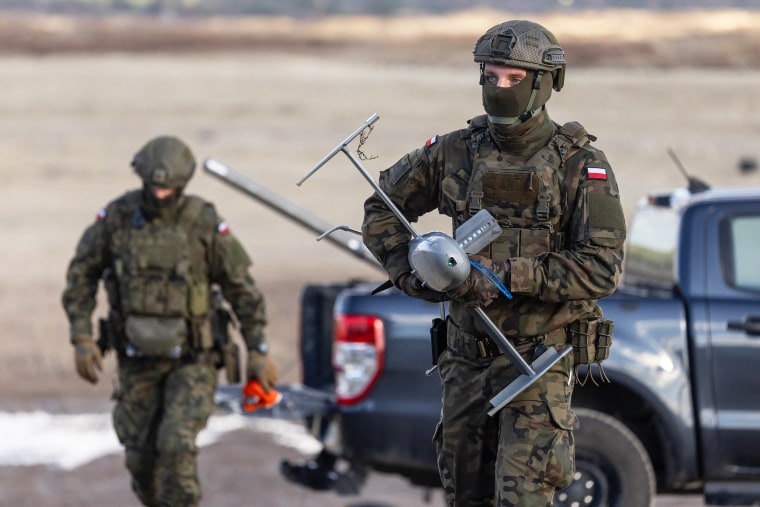Kyiv — Ukrainians found themselves in the dark on Thursday.
As the latest wave of Russian drones plunges parts of the country into cold power outagesIn Kyiv and throughout Europe there was concern about new 28-point “peace plan” approved by President Donald Trump, a senior administration official told NBC News after weeks of secret talks.
Ukraine and its allies on the continent had previously been sidelined from talks between Washington and Moscow, and there was conflicting information about whether they were participating this time.
No details about the details of the plan have been officially released, but President Volodymyr Zelensky's office said he “received a draft plan from the American side” in a statement on Telegram. The statement added that he agreed to “work through the plan's points in such a way as to ensure a dignified conclusion to the war.”
a growing sense that the plan could resemble a Russian wish list threatened a nightmare scenario for Ukraine at a time of particular danger, with her government is mired in a corruption scandal and its armed forces are struggling to contain devastating setbacks on the battlefield.
Zelensky has come under intense pressure this week from his political opponents, but even they have been extremely wary of any deal that would require their country to capitulate.
“I’m not entirely sure who actually worked on this particular plan,” opposition lawmaker Vadim Ivanchenko said in an interview. “No one has officially presented it or explained the logic behind its provisions.” According to him, the issues that are currently being discussed in the media “contradict the interests of Ukraine.”
A U.S. official who spoke to NBC News about the plan said both Russian and Ukrainian officials were involved in those discussions, but that differs from a source close to the Ukrainian government and a European official familiar with the matter. The Kremlin was evasive.
“Is this true or not?” Sergei Markov, a commentator and former adviser to President Vladimir Putin, spoke to NBC News about whether a deal was done. “We don't know.”

In Kyiv, the timing of this plan was considered no coincidence, a source close to the Ukrainian government said, likely an attempt by the Kremlin to take full advantage at an extremely difficult time: not only drones, but also Russian forces continue to fall on its cities Looks like they are ready to capture the strategic city of PokrovskIt is a key battlefield victory that could open up the rest of Ukraine's Donbass to the Russian war machine – unless it is toppled under pressure from Washington.
Meanwhile Zelensky Shocked by $100 million corruption scandal involving one of his close associates, senior government officials and the country's vital state-owned energy company. He also faces pressure to fire his all-powerful chief of staff. Andriy Yermak, often seen as the power behind the throne.
Ivanchenko, a lawmaker from the Batkivshchyna political party led by former Prime Minister Yulia Tymoshenko, acknowledged that “we are in a somewhat vulnerable position.”
This is “not a disaster or a failure,” he said. “But also not a position of strength from which we would ideally enter any negotiation.”

Asked on Wednesday whether “only” Trump could end the war, EU foreign policy chief Kaja Kallas responded with a sharp “no.”
“To end this war, you need Ukrainians and Europeans to agree to these plans,” she told reporters. A number of European foreign ministers who met with Callas in Brussels expressed caution but made it clear that they would not allow Kyiv to be forced to capitulate.
Ukrainian officials have no choice, at least publicly, to be positive about U.S. efforts—Zelensky learned this the hard way after going through Trump's humiliation of the Oval Office. Since then, the American president has held a number of summits and meetings. seems to hesitate between preference for Russia or Ukraine and subsequent rollback.
“I have a good relationship with President Putin, but I'm a little disappointed in President Putin right now. He knows that,” Trump said at the US-Saudi Investment Forum on Wednesday.
There was a seemingly positive message from senior Pentagon officials visiting Kyiv, led by Army Secretary Dan Driscoll. And Secretary of State Marco Rubio struck a balanced tone on X, saying that “a lasting peace will require both sides to agree to difficult but necessary concessions.”

Alena Getmanchuk, Ukraine's ambassador to NATO, said in an interview Wednesday that Trump's “determination to seek a firm diplomatic solution is really commendable.” However, she warned: “It is critical for Ukraine that any peace plan respects our sovereignty and territorial integrity and prevents future Russian attacks by ensuring Ukraine does not become an easy target for the next round of aggression.”
Indeed, it is not only Ukrainians who find these proposals troubling. Many European governments view the idea of ceding territory to Russia and imposing future limits on Ukraine's ability to defend itself not only as rewarding Putin's aggression, but also as encouraging him to strike elsewhere in Europe.
That's why the stated terms of Trump's plan create an “extremely dangerous international precedent,” according to Danil Metelsky, director of the Center for Social Transformation, a nongovernmental organization based in Kyiv. “If territories captured by force remain under the control of the aggressor state, this undermines the entire post-war world order.”

Russia's position None of that appears to have changed at all: It still requires “eliminating the root causes of this conflict,” Putin spokesman Dmitry Peskov told reporters on Thursday. That is: Ukraine must cede territory, weaken its army and promise never to join NATO.
According to James Nixey, a longtime Moscow watcher and independent consultant based in England, Russia needs to “navigate between its maximalist goals” and not risk Trump “supporting Ukraine more than ever.” “So it's difficult for the Russians, too. They don't know how far they can go, but they're trying like hell.”
Now the question is: “Will this go the way of previous attempts at a peace process? Rejected by Ukraine and Europe,” Nixey added. “Or will the pressure – battlefield pressure, societal pressure, US pressure – be too much for Ukraine and it will have to de facto surrender? Because that's what it is.”
Darina Mayer reported from Kyiv, Ukraine, and Alexander Smith and Elmira Alieva reported from London.








